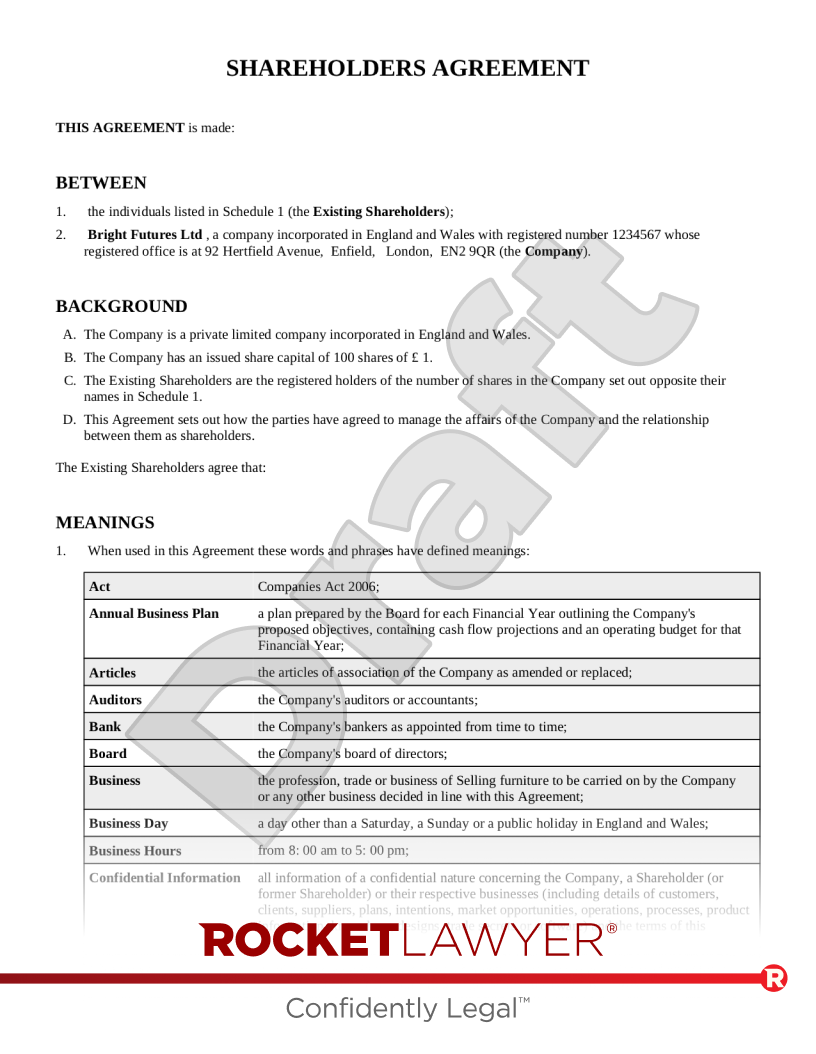Specific events
In the Shareholders' agreement or Articles of association, a company may place an obligation on the shareholders to force a sale of their shares if a specific event is triggered. Some of these 'trigger events' can include:
-
death of the shareholder
-
bankruptcy of the shareholder or insolvency of the company
-
change of control of the company
-
cessation of employment (especially if the shareholder is a director or employee of the company)
-
mental or physical incapacity of the shareholder
-
retirement
The reason for having compulsory transfer provision (also known as a ‘leaver provision’) is to protect the interests of the company. For example, in the absence of any agreement or provision providing otherwise, any shares held by a deceased shareholder will pass under the terms of their Will (if they had one) or under the rules of intestacy. This could mean that a surviving spouse or children of the deceased could hold a significant shareholding in the company.
If an employee or director (who is also a shareholder) is leaving the company, it makes sense for the company to obligate the shareholder to sell their shares as well. Most employee shareholding schemes are an incentive for employees with valuable skills to remain with the company until a specified time.
For how much should the shares be sold?
Once a trigger event occurs requiring the shareholder to sell their shares, the question becomes what price the shares should be sold or bought at. Shares can either be sold:
-
at market value - where the shares will be sold at the price at which the market deems the shares to be worth
-
at their nominal value - where the shares will be sold at the price for which they were originally sold or bought
The distinction between market and nominal value is important as the difference in the value of the market and the nominal value in some shares can be extreme.
There may be provisions in the shareholders’ agreement or articles of association that detail what the price of the shares will be. However, some trigger events will automatically mean that the shares will be sold at market or nominal value. These provisions are called 'good leaver' and 'bad leaver' clauses.
Leaver events
When a shareholder leaves the company, triggered by a specific event, they will be considered either a 'good leaver' or a 'bad leaver'. Depending on how they left the company will determine the value of their shares upon their departure.
Good leaver
'Good leavers' are considered to be those who depart from the company on good terms or through circumstances beyond their control. This is usually the case with the death of the shareholder, ill health, redundancy or resignation after an agreed period of service.
The shareholders' agreement should set out a comprehensive definition of a good leaver event.
A shareholder leaving as a good leaver will usually receive the market value for their shares. Market value is generally determined by a third party, most commonly an accountant/financial adviser or a solicitor. Sometimes the shareholders' agreement will be prescriptive and set out the valuation approach to be adopted. The most common approaches include asset-based valuations or an 'Earnings before interest, tax, depreciation and amortisation (EBITDA)'. This is an indicator of a company's financial performance and therefore can help determine a company's share value.
Bad leaver
'Bad leavers' are typically those who depart from the company on bad terms or circumstances. These can include:
-
breaches of the Director's service agreement, Employment contract or shareholders’ agreement
-
summary dismissal for gross misconduct
-
dismissal which is not constructive or unfair
-
resignation after a short period of employment
It's important to also have a comprehensive definition of a bad leaver event, in the same way as for a good leaver event.
The value of the shares for a bad leaver is generally the nominal value. This could be the higher of:
-
the par value for the shares (ie the share's face value)
-
the price paid originally for the shares
Ask a lawyer if you need help drafting bespoke clauses dealing with a compulsory transfer of shares and any provisions relating to good and bad leaver events.




